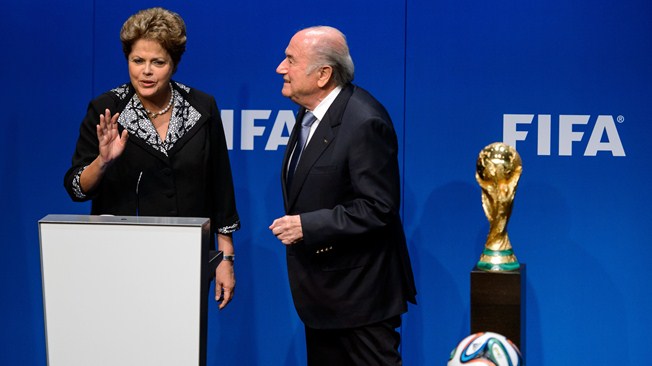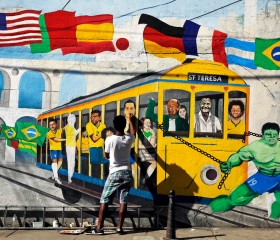Desafinado. Is FIFA’s sports diplomacy out of tune with Brazil?
(no votes) |
(0 votes) |
It’s time for the FIFA World Cup in Brazil and stadiums throughout the Samba Land are filled with large English posters promoting the slogans of FIFA’s sports diplomacy. We asked Eric Ehrmann, Brazilian columnist and RIAC blogger, to share his views on Mundial 2014 and its implications for Brazil and other countries that host this event.
It’s time for the FIFA World Cup in Brazil and stadiums throughout the Samba Land are filled with large English posters promoting the slogans of FIFA’s sports diplomacy. We asked Eric Ehrmann, Brazilian columnist and RIAC blogger, to share his views on Mundial 2014 and its implications for Brazil and other countries that host this event.
From your perspective, what is sports diplomacy? How would you describe the impact it has on international relations?
Writing for The Huffington Post in 2013, Derek Shearer, a non-career diplomat who was United States ambassador to Finland (1994-97) under President Bill Clinton borrowed the words of South African leader Nelson Mandela, saying said that “sports diplomacy has the potential to save the world.”
The U.S. Department of State claims to have coined the phrase ‘sports diplomacy’ in 1961, defining its current sports diplomacy strategy as an educational outreach program designed to build international friendships and promote the image of the United States.
In fact, sports diplomacy means different things to different constituencies across the world that has come under increasing influence from globalization. Moreover, it has become politically incorrect, for example, to associate FIFA’s “sports diplomacy” with the global governance movement, which seeks to mediate and reduce the role that national governments play in regulating the world economy.

Institutions And Competition Blog
What is the significance of holding an international sports event?
With interest in FIFA football expanding in the southern hemisphere, particularly in Africa and South Asia, FIFA took a calculated risk in 2004, shifting its focus to emerging economies by awarding the 2010 FIFA World Cup to South Africa.
With Nelson Mandela stating that “sport has the power to change the world,” South Africa was a perfect fit for FIFA’s sports diplomacy and its key messages of “for the game, for the world” and “say no to racism”.
The prestige earned by South Africa hosting the FIFA World Cup tournament outweighed the nation’s weak international tourist base and had a positive impact throughout Africa. At the same time, South Africa’s limited financial resources for developing the needed infrastructure required FIFA to take a more limited profit from the event, which can be seen in the context of positive discrimination as a consequence for the bloody decades of apartheid policy.
What does a host country need to do to make the event successful?
It has become politically incorrect to associate FIFA’s “sports diplomacy” with the global governance movement, which seeks to mediate and reduce the role that national governments play in regulating the world economy.
To become a successful FIFA World Cup host country, it helps to be a great tourist destination. In spite of its reputation as a great place for music, football, partying and eco-tourism, Brazil does not even qualify as one of the world’s top 50 tourist destinations. The latest statistics from the United Nations World Tourism Office (UNWTO) measured by international arrivals show that that the Land of the Samba attracted only 5.6 million tourists in 2012.
France, the world’s top tourist attraction, attracted 83 million visitors during the same period. Russia, which will host the FIFA 2018 World Cup, attracted 25.7 million visitors that same year. South Africa, which hosted the 2010 FIFA World Cup, had only 9.1 million tourists in 2012.
While American and British media criticize Brazil for failing to provide the appropriate infrastructure to host the World Cup, it was FIFA that made the decision in spite of knowing a decade in advance that the very same class conflicts and cultural and work ethic issues that delayed the functional opening of Brazil’s new capital, Brasilia, half a century ago have continued to grow along with the economy as it transitioned back to a state-dominated democratic form of government. FIFA and Brazil both grossly underestimated the costs associated with developing infrastructure to host the 2014 World Cup tournament and they only had several years of advance time to work on setting it right.
For its part, the Workers Party government of President Jose Inacio “Lula” DaSilva and his inner circle of politicians who emerged victorious in 2002 saw the FIFA World Cup as a political goldmine and behaved accordingly. Brazil’s economy, insulated for the first three years of the ongoing global crisis, started underperforming in 2010, causing an economic slowdown that took precedence over constructing World Cup infrastructure.
Hoping to capitalize on his reputation as Brazil’s most popular political figure, Lula, who was not permitted by the national constitution to seek a third consecutive term, became the political godfather to Dilma Rousseff, his chief of cabinet and a former minister of energy. Dilma was elected Brazil’s first female president in the second round of voting on October 31st, 2010 winning with 55% of the popular vote. Unlike Lula, who supports the Sao Paulo side Corinthians, Dilma was not a fan of sports diplomacy or football. Her agenda focused on stabilizing Brazil’s economy, providing unemployed with a minimum wage welfare plan, increasing the rights of women and expanding programs to empower the working poor.
The Brazilian sports minister at the time was Orlando Silva, a member of the Communist Party of Brazil (PCB). He was, effectively, the man responsible for coordinating government infrastructure programs associated with the World Cup. Silva resigned from the Dilma cabinet in an apparent corruption scandal. He was replaced by Aldo Rebelo, another member of the PCB, who is a supporter of the Sao Paulo side Palmeiras, the traditional team of Brazilians of Italian heritage. Rebelo has continued in what has become a high profile position, working with FIFA’s executive director Jerome Valcke, a former French diplomat, to reconcile problems between FIFA and the government.
Dilma started paying more attention to the World Cup last year when around a million people took to the streets across Brazil protesting inflation, expensive higher education and high public transportation costs. Protesters, some mobilized by international activists, claimed that the government was spending money to support FIFA football that should have been spent improving the lives of average Brazilians.
Over the past few months, Dilma’s media team has cleverly turned the “just say no to the FIFA World Cup” issue around. With her reelection bid coming in October after the World Cup, she is now the most famous supporter of the national team. Her press office even released a confessional style document in which she admits to having been a supporter of the team in 1970, even when she was a political prisoner and allegedly tortured by the military regime.
When in 2007 Brazil was selected without competitive bidding by FIFA to hold the 2014 World Cup, it already had garnered the prestige of winning the tournament five times. Its major qualification was that it exported the largest number of football stars to the top teams of Europe and thousands more to FIFA football clubs around the world.
The clubby relationship between Brazil’s political class and the influential corporatist-style quasi-government industries known as “the six champions,” (os seis campeões) - which have some structural characteristics similar to those of the South Korean chaebols and Japanese keiretsu business alliances—caused unforeseen problems for FIFA and its hybrid governance model.
With the World Cup tournament coming to an end, Brazil’s government and FIFA have gone quiet on their differences regarding infrastructure issues and costs. Local and global media, bloggers and citizen journalists are spending less time, and editors are publishing fewer stories covering the high costs, protests and violence by police and demonstrators.
What has been achieved in terms of sports management, politics and economy in Brazil? What remains to be done?
Regardless of who wins the tournament in Brazil, the takeaway for FIFA will be how profitable the event is for the organization. It will take around a year before the accounting is finished and it is at FIFA’s discretion whether or not to reveal that information. Last year FIFA Director General Jerome Valcke of France forecast that the organization hoped to earn a profit of $200 million from the Brazil tournament.
The total cost of infrastructure to the Brazilian government, and the Brazilian people, is likely to be revealed in full after the October 2014 presidential election along with funds provided and traded between the large quasi-government companies and the National Development Bank (BNDES) who performed and helped finance the work. The communications team supporting president Dilma projects that the World Cup has attracted around 600,000 tourists to the country, the majority coming from the United States. They also project that the World Cup will generate revenues equal to $3 billion for the 12 cities that are hosting games.
FIFA has been successful in causing Brazil’s left of center democracy to loosen its strong stance on regulatory issues and engage in mediation and remediation processes associated with the globalist governance model that it represents. Meanwhile, Brazil still lacks a viable sports management infrastructure. FIFA approved of Brazil hosting a World Cup without a dedicated sports management university like the one that exists in Moscow. Those seeking jobs in sports management sometimes find them through personal or family contacts. Others sometimes hold journalism or propaganda and marketing degrees from state and private universities in Brazil. A smaller group attends more expensive business and management schools in the United States, England or Switzerland. They can also try to offset the costs by competing for scholarships.
Unfortunately, the FIFA World Cup has done little to change or modernize football infrastructure in Brazil. The head of the Brazilian Football Confederation, which is part of FIFA, is 82 year old Fernando Marin of Sao Paulo. He replaced Ricardo Teixeira, who was head of the CBF and the LOC until resigning both positions amidst allegations of improper activity. Teixeira is the son-in-law of Joao Havelange, a longtime FIFA board member and former chairman of the International Olympic Committee. Havelange last year resigned his position as honorary president of FIFA after an investigation found that he had engaged in improper activity, just as his son-in-law has done.
Attendance at Brazil’s first division football league games has dwindled due to the poor quality of play, the less frequent violent fouls the fans like to watch, and the lack of big name stars. It has become a made for television league with a clique of a dozen clubs cooperating to control television rights. A history of manipulated games adds to the league’s reputation problem.
The FIFA World Cup has done little to change or modernize football infrastructure in Brazil.
Since so many of Brazil’s top stars play in Europe, membership in the international 6X49 football pool consortium offered by Germany’s national lottery and other lotteries in the European Community could bring additional revenue to Brazil help increase funding for government education and “green” sustainability programs. In this set-up, players pick winners and losers and ties on six of the forty nine games. But 6X49 would meet strong opposition from Brazil’s bureaucratic National Lottery, its parent the state owned Caixa Federal Bank and the illegal “Animal Game” lottery that has existed since Brazil was part of the Portuguese empire.
By the end of this year the afterglow of the Brazil World Cup will have faded away and FIFA’s focus will again turn to the question of President Sepp Blatter’s reelection bid and Russia and Qatar. How will FIFA sports diplomacy fit into those future World Cup venues? In addition, as the global financial crisis continues, other critical issues loom on the horizon. Fewer nations are able to manage the costs and political risks associated with mega-sports events. Rejected by the Swiss ski resort of St. Moritz (Switzerland) and Munich (Germany), the International Olympic Committee is still searching for a venue to host its 2022 Winter Olympic Games.
Will FIFA also find it difficult to find venues to host the World Cup? Will FIFA’s sports marketing partners develop less expensive platforms to promote their brands via social media on the internet? Will FIFA sports diplomacy fade into the sunset and give way to the state department’s low key “hearts and minds” approach? Regardless of who the president of FIFA is next year, this is the moment for the organization to modernize and actively reposition itself for the future.
Interviewer: RIAC Program Assistant Maria Gurova.
(no votes) |
(0 votes) |





